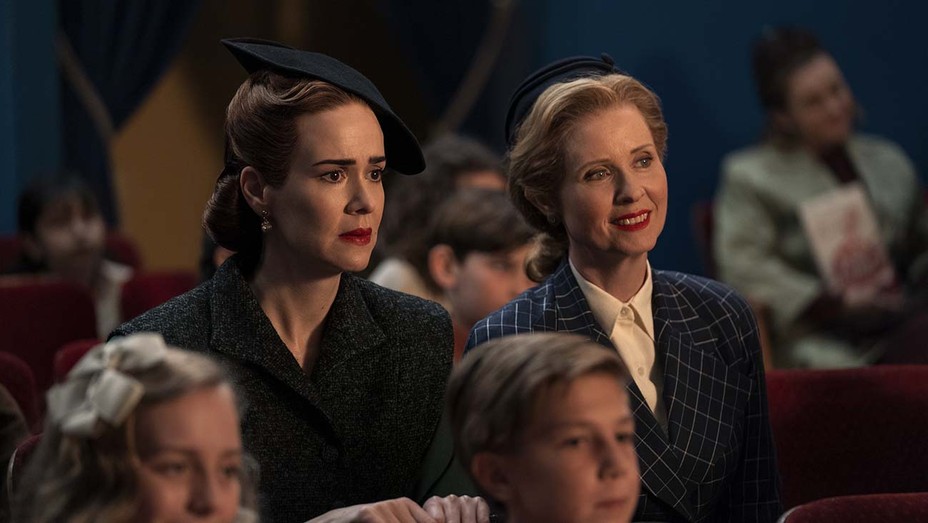Releasing on September 18, 2020, Netflix’s ‘Ratched’ is a psychological drama set in a very Hitchcockian post-war 1940s. Made by the same creative team that has also produced ‘American Horror Show,’ ‘American Crime Story,’ and ‘Glee,’ ‘Ratched’ is exactly the type of TV entertainment that you expect it to be: Shock-inducing, self-aware, and unhinged. There is not a single long moment of quietness and reflection in its nearly eight-hour runtime. Scene after scene, your senses are assaulted by Ryan Murphy’s staple macabre and overindulgence, keeping you perpetually at the edge of your seat.
On the contrary, ‘One Flew Over the Cuckoo’s Nest’ is a restrained drama about the harrowing condition of a group of patients in a psychiatric ward, and the casual cruelty they endure in the hands of the nurses and orderlies. The projects could not be more different, and yet, there is a definitive connection between the two. In this article, we explain what it is.
What is ‘One Flew Over the Cuckoo’s Nest’ (1975) About?
Directed by Czech-American filmmaker Miloš Forman, ‘One Flew Over…’ is the cinematic adaptation of the 1962 novel of the same name by Ken Kesey. The film tells the story of repeat offender R.P. McMurphy (Jack Nicholson), who, to avoid serving his sentence in a prison farm, pretends to have mental health problems and is sent to a facility in Oregon. Once there, he meets Mildred Ratched (Louise Fletcher), the head nurse with a 1940s devil horns hairdo who runs the institution with an iron fist. Immediately after his relocation, a free-spirited and independent-minded McMurphy gets into a conflict with Ratched, without realizing that the length of his stay there is significantly dependent on her evaluation of him.
His continuous acts of rebellion against her tyrannical authority inspire his fellow patients to raise their own voices against her. Her retribution comes swiftly and fast. McMurphy is put through electroshock therapy after he gets into a brawl with an attendant. But that fails to dampen his spirit. He is still as anti-establishment as he ever was. However, after one of his fellow patients commits suicide because of Ratched’s abuse and threats, and she blames him for it, McMurphy attacks her, nearly strangling her to death. He is subsequently lobotomized, which turns him into a shell of a man that he once was. One of the other fellow patients mercifully kills him by smothering him with a pillow before escaping from the facility.
Upon its release, the movie was a massive critical and commercial success and is considered one of the greatest films of all time. It won five main Oscars that year, including best picture, best actor, actress, and director.
How ‘Ratched’ Connects to ‘One Flew Over the Cuckoo’s Nest’
In one of her interviews, Fletcher once stated that Ratched’s 1940s hairdo is “a symbol that life had stopped for her (Ratched) a long time ago”. Murphy’s upcoming show explores just that, Mildred’s life in the 1940s. In this new rendition, she is portrayed by Sarah Paulson, a long-time collaborator of Murphy. ‘Ratched’ delves deep into the character’s history to figure out what made her the banal despot filled with a seething menace that appears in the film. Although reimagining of classic films or TV shows from the antagonist’s perspective is not a new thing, it definitely has seen a resurgence in recent years with projects like ‘Maleficent’, ‘Joker’, and ‘Hannibal’. And like these examples, ‘Ratched’ seeks to humanize its central character as well as make her more relatable and her eventual actions more understandable.
The main problem with this is that there was very little information available on her before the show. Neither the film nor the book provided her with a backstory. Kesey did not even give her a first name. This means that the showrunners had to come up with basically everything. Now, this could have been either a boon or a curse. Considering Murphy’s résumé, he likely preferred to have a clean slate, which allowed him the freedom to take the plot in whatever direction he wanted.
The film’s Ratched is arguably the most quintessential example of the Battleaxe Nurse, a trope that denotes a sadistic, most often female authority figure in a medical institution. Because of this, the film has garnered some criticism for being what the detractors call “anti-feminist.” The show, with its focus on Ratched, easily negates that and creates a narrative that not just pro-women but pro-LGBTQ as well.
Read More: Where is Ratched Filmed?

